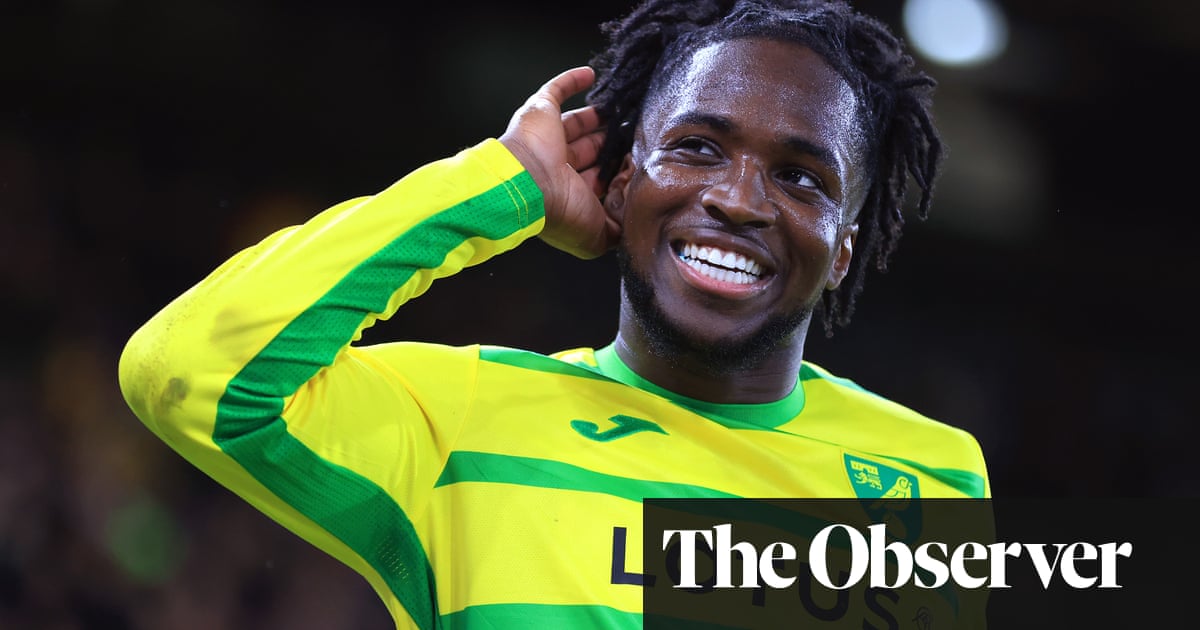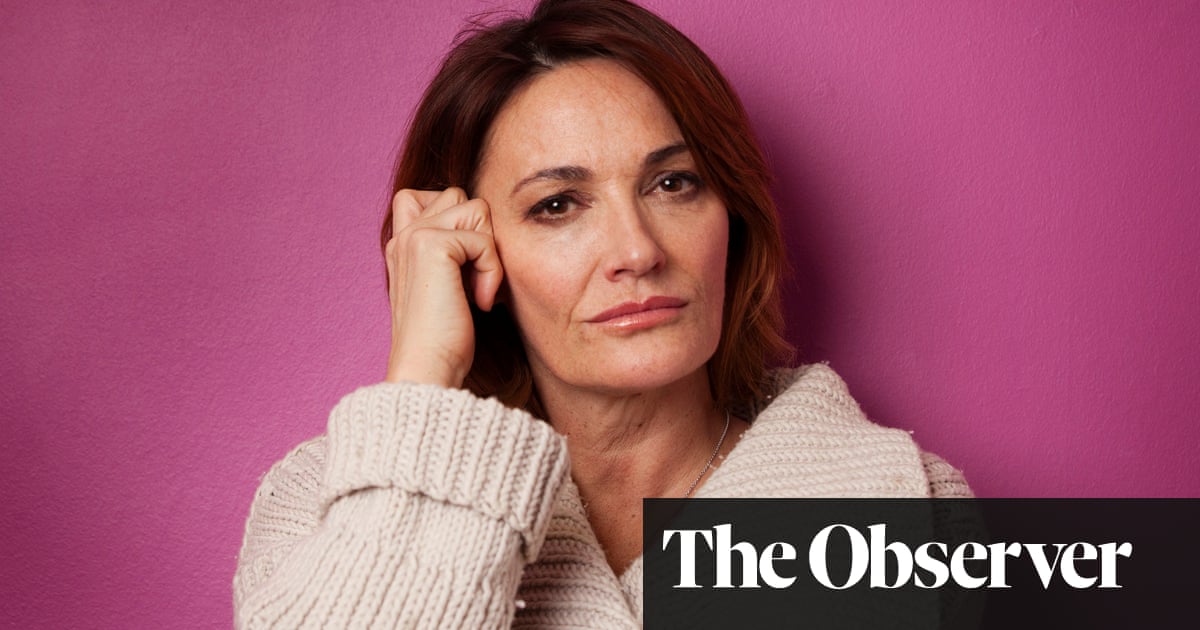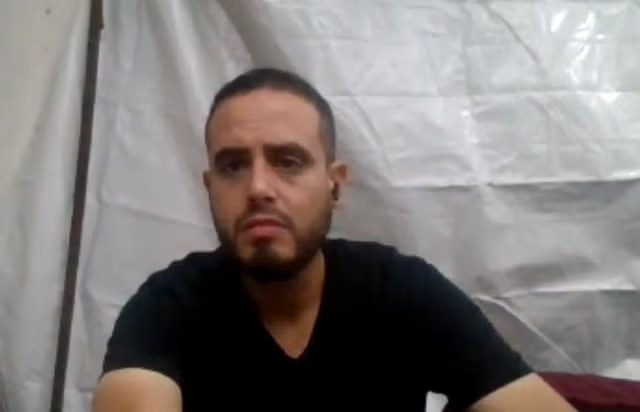
The actor Will Poulter arrives for our lunch date alone, 15 minutes early and, perhaps counter-intuitively, carrying a bag of his own food. He explains that he’s on a strict diet for a film role, but can’t tell me what the part is. He buys a juice from the café that I’m not sure he actually wants, and suggests we sit outside, which is pretty damp and cold if I’m honest, because he thinks it would be taking the piss somewhat to occupy a table inside when he’s only bought a drink. Poulter’s thoughtful like that. He then unwraps what looks like a chocolate Rice Krispie square, but tastes much less fun apparently, and apologises that I have to watch him chomp his way through it. “I’m speaking fluent cake,” he says, chewing dutifully. He has just come from a workout and it’s clear that his pandemic experience has included more than just the occasional Joe Wicks session. He wears a black Nike compression shirt, mercifully less figure-hugging shorts and, though it’s not very 2021 to note this, the guy is shredded.
The whole, slightly strange scene makes a lot more sense a couple of weeks later when the reason for Poulter’s carb-loading and gym-bunnying is revealed. The gig he couldn’t talk about is that he has been cast in Marvel’s Guardians of the Galaxy Vol 3 as Adam Warlock. Even if you’re not that invested in the superhero universe this, in Hollywood power terms, is a big deal. It’s rumoured that pretty well every 20-something actor here and in the US and beyond wanted the role. It is a huge coup for Poulter and the 28-year-old from west London is taking the transformation into Warlock, a character genetically created by scientists to be the perfect, invincible human, seriously. And if that means eating bland, protein-packed oat snacks, so be it.
“I’m inherently greedy so it could be worse,” says Poulter. “And there’s nothing more boring than hearing actors talking about how they’re struggling to eat a lot of food that has been sent to their door for free.”
A blockbusting Marvel film is a step up, at least in notoriety, for Poulter in what has already been a precocious career. He made his debut at 13 in Son of Rambow, Garth Jennings’s charming, effervescent 2007 indie film about a pair of schoolboys who recreate Sylvester Stallone’s First Blood with a home-movie camera. While still a teenager, Poulter was snogging Jennifer Aniston in the 2013 comedy We’re the Millers. Then followed roles with more dramatic heft: he left Leonardo DiCaprio for dead in the Oscar-winning The Revenant, was a racist cop in Kathryn Bigelow’s Detroit and gave us nightmares in the Swedish horror flick Midsommar.
Poulter clearly has an ear for accents, but directors have noticed that he really excels at playing characters you can’t immediately get the measure of. He’s handsome no doubt, but he can switch between sweet and boyish in one scene to downright menacing the next. “I’m aware I’m kind of alternative-looking,” says Poulter, picking his words. “Just not classic or, I don’t know, outside the norm. I’ve always been told I’m quite expressive.”
When you Google Poulter’s name, one of the predicted searches is: “Who is the actor with the eyebrows?” He clearly has mixed feelings about the notoriety of his boomerang ’brows. “It’s funny when people comment on my eyebrows, it’s as if they don’t realise that’s something I’m used to,” he says. “They’re on my face and they are directly above my eyes so I’ve seen them. Sometimes people comment on them like they just landed on my forehead. But yeah, that has become a thing and I can’t escape it really. If I shaved them off, I’d have less of an emotional range, so I just decided to keep them.”
We will have to wait until at least May 2023 for the third instalment of Guardians of the Galaxy, but before then – and this Poulter can talk about – he has logged another nebulous, hard-to-read performance in a gripping eight-part drama on Disney+ called Dopesick. The series tracks an American town that unravels during the opioid epidemic, which gathered speed with the introduction of OxyContin, a “non-addictive” wonder drug made by Purdue Pharma, in the mid-90s. Opioids were responsible for the fatal overdoses of nearly 500,000 Americans between 1999 and 2019, and the life-crushing addiction of millions more. Dopesick is a heavyweight production, with Michael Keaton as a family doctor and Poulter as Billy, the slick Purdue sales rep who convinces him to prescribe the painkiller.
“Working with Michael Keaton was really one of the most special experiences of my life,” says Poulter. “He’s one of those people who draws things out of you that you don’t ordinarily have. He’s just stunningly good.”
Beyond an unimprovable cast – which also includes Kaitlyn Dever, Rosario Dawson and the great Michael Stuhlbarg as Richard Sackler, the head of the dynasty that owns Purdue – Poulter clearly feels the story is an important one to tell. He comes from a medical family: his mother was a nurse and his father Neil is professor of preventative cardiovascular medicine at Imperial College, London; one of his sisters runs a Covid vaccination centre and has spent much of the past 18 months working in intensive-care units. For good measure, Poulter’s other sister is a teaching assistant for children with special needs. “What I do in comparison,” he laughs, “feels quite self-obsessed and narcissistic.”
Acting will never compete with these “far more noble pursuits”, but Poulter believes he has a duty, where possible, to select projects with a social conscience. Dopesick is one of these. Another was Detroit, Bigelow’s 2017 crime drama inspired by riots in the city in 1967 that resulted in 43 deaths and more than 7,200 arrests. “When you think about social movements, be it Black Lives Matter, be it MeToo, given the fact I’m just a straight, white male, there’s a personal responsibility to make sure I’m contributing to those conversations and those movements positively,” says Poulter. “And that I’m not being a bystander.”
Detroit, in particular, was an awakening for him, especially conversations he had with Ziza Delgado, a professor in ethnic studies at Berkeley. He has subsequently become involved in the UK with the Black Curriculum, a social enterprise that wants to change how black history is taught in schools. “But at the same time, I don’t want to kid myself about what my limitations are,” Poulter goes on. “I’m an actor, not an activist, and I don’t commit my life, nor do I make my living by being an activist. A project like Dopesick, which does shed a light on injustice, or does try to, I feel very lucky to be part of those conversations. But I’m under no illusions that, at the end of the day, I’m an actor, and if I want to be an activist, then I quit acting and become an activist.”
With Billy, his character in Dopesick, Poulter created a dense backstory, as he often does. He read Dale Carnegie’s classic self-improvement text, How to Win Friends and Influence People, because that’s the kind of book he thought an ambitious, manipulative sales rep would seek out. There were a couple of lines in the script about how Billy had high-achieving creative parents, and he jumped on those. “Billy’s motivations around wanting to be a successful sales rep probably stemmed from insecurities as a kid,” says Poulter. “And not necessarily being a success in the eyes of his parents. He was the guy at school who wasn’t popular and got overlooked, and was distinctly average…” A wry smile, “Maybe inspired by my own experiences.”
Poulter doesn’t immediately jump out as “distinctly average” – he has built the kind of varied career that child actors rarely do – , but he insists it is the case. He has dyspraxia and struggled to keep up academically at school. He was bullied. He has had “mental-health issues for as long as I can remember” and these eventually led, as a teenager, to being diagnosed with depression and generalised anxiety disorder. “I always felt like I was too young to be contemplating the idea of having depression,” he says. “And it was something I think performing and drama helped me sort of purge to a degree, or even informally treat. But yeah, it made life outside of that quite, quite difficult.”
School was Harrodian in Barnes, west London, which now has a reputation as a hothouse for young actors and performers. Robert Pattinson went there, so did Tom Sturridge and 1917’s George MacKay, along with the superstar YouTubers JacksGap, the twins Jack and Finn Harries. Poulter thinks it is less about the school, and more about two teachers one of whom, Laura Lawson, created an after-school comedy club that took a cast of 13-year-olds – including Poulter – to the Edinburgh Fringe. “I say to Laura, she was the reason I went to school,” says Poulter. “I was getting up and going to school for that one hour of drama on a Friday. And it was about just getting to that Friday morning, and then seeing out the rest of the day and then there was the weekend.”
When he was shooting Son of Rambow, acting became all Poulter could imagine doing. “I came back every day saying, ‘This is what I’m going to do for the rest of my life!’” he recalls. “And my parents were a bit like, ‘Chill, chill, chill…’ But then they looked at my grades and were like, ‘It’s probably a good thing that Will is going off and doing this alternative summer camp.’ And I was so unhappy at school, and so happy whenever doing drama, that I think they were delighted this incredibly rare opportunity came along and would distract me for a while.”
Poulter did end up at university, studying drama at Bristol for a year, but professional assignments kept rolling in. Most of his training has been on the job, often alongside some of the most famous actors on the planet. “Generally speaking, I’ve been very, very lucky with those people, but don’t get me wrong, I have a lot of pinch-myself moments or times where I’m on my own in my hotel room thinking, ‘Did I just do a fucking scene with Leonardo DiCaprio?’ There are definitely moments where I’m conscious of the fact there is a fanboy inside me.”
When he first started acting, Poulter would throw himself into characters, almost, he thinks now, to the extent of not developing his own personality. “It felt like a reprieve from being who I was on a day-to-day basis,” he says. He feels he is in a better place now. Therapy has helped; Matt Haig’s books have, too. He stays off social media, except to spread the word of campaigns he believes in, such as anti- bullying initiatives and World Mental Health Day.
The pandemic was stressful, mainly because he worried about his family, but Poulter – who lives on his own in east London – feels he has come through it pretty well unscathed. “As an actor, you spend a lot of time unemployed, so lockdown wasn’t wildly different to a lot of the time that I’ve spent,” he says. “And I am a bit of a social recluse as well, I guess, so it wasn’t a huge adaptation for me.”
As for being “unemployed” that’s less of a problem these days: during the Covid era, in addition to Dopesick, Poulter also shot a musical, The Score, with Johnny Flynn and Naomi Ackie, and wrapped Hugh Laurie’s directorial debut, an Agatha Christie adaptation, Why Didn’t They Ask Evans? “I’ve never been that busy,” he says. “But more than me being in demand, I guess it’s a reflection of the industry picking itself back up after a dormant period.” In lockdown, Poulter also recorded the audio book of Dostoevsky’s Crime and Punishment: “I don’t think Audible quite realised that they’d asked a dyspraxic kid to read Crime and Punishment until I’d over-recorded by about four days.”
Perhaps Poulter’s biggest release is collecting sneakers. At home, he has a custom-designed shelving unit for his shoes, which are exclusively Nike and currently number – he guesses, though I wonder if he skews low so he doesn’t come over as some Imelda Marcos of streetwear – around 50 pairs. Generally he goes for a “stock and rock situation”, which means he buys one pair to wear, and another to keep pristine and box-fresh. “I’m just obsessive about them, it’s a sickness really,” he admits. “It’s my one really extravagant habit that I need to keep a bit of a lid on.”
There’s a story that Poulter cleans his shoes with tiny toothbrushes – that isn’t true, is it? “I do do that,” he sighs. “Yeah, and I actually carry around wipes for my shoes in my bag here.”
Landing the Guardians of the Galaxy gig will make Poulter very famous and, while you worry for his sneaker habit, his moral compass seems secure. He’s attentive, considerate and humble; the phrase “couldn’t happen to a nicer guy” could have been coined for him. If anything, it seems likely Poulter will use his celebrity to bring greater attention to the causes he believes in and work on projects that he considers important.
By coincidence – without any inkling of the big announcement round the corner – I happen to ask Poulter how he would respond if he were offered a role in a big franchise. What would that mean for the message-driven films he seems drawn to? His response is revealing. “I think it’s about balance,” he replies. “Also, being frank, it’s about recognising that certain jobs open doors to other things that you would really like to be giving attention to or platforming. There’s an argument to be made that you can’t do one without the other. Or that you can, but it’s just harder and sometimes leads to less success, I guess.”
He takes a bite of his oaty-krispie-cakey thing and munches for a few seconds in silence. “So I don’t honestly know, I’m trying to wrestle with that balance myself at the moment,” he continues. “But certainly my hope is that, on balance, I can create a portfolio that does carry a lot of messaging and meaning that I feel proud of and I can stand by.”
He has to go. I ask if he wants a coffee or something for the road. “I’m fine, thank you,” he replies, patting his bounty of designated food for the day. “I’ve got plenty of treats in the bag.”












